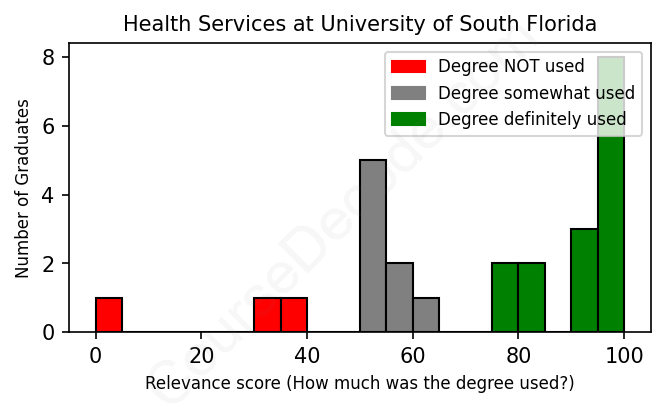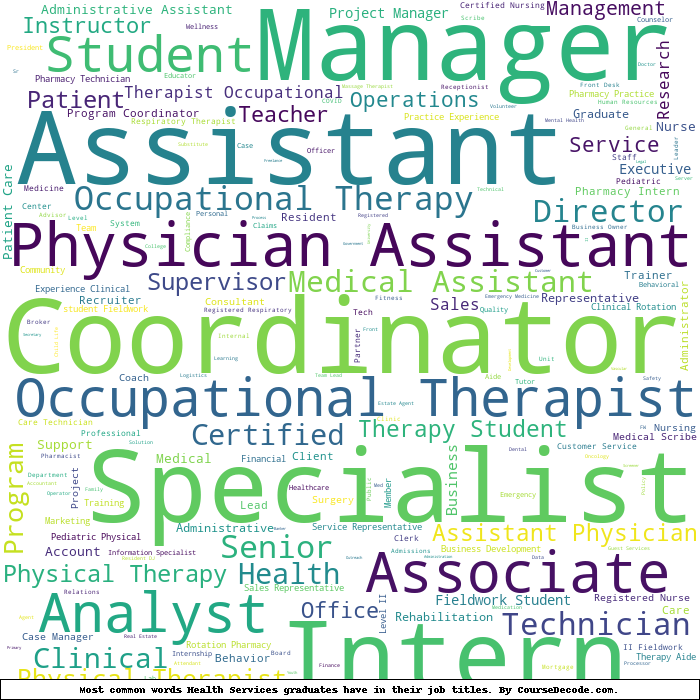
First, some facts. Of the Health Services graduates from University of South Florida we've analyzed , here's how many have used (or NOT used) their degree in their career:

These are estimates based on AI analysis of 26 LinkedIn profiles (see below).
The verdict? Slightly above average. Overall, with an average relevance score of 72%, Health Services graduates from University of South Florida have a slightly higher likelihood (+5%) of finding work in this field compared to the average graduate across all fields:
And for comparison, here's the chart for all profiles we've looked at across all degrees.
Also, after graduating, 46% of these graduates have pursued further education other than another Bachelor's degree (such as a Masters degree or other), compared to the average across all profiles of 35%. This suggests you may need more than just a Bachelors degree to be competitive as a Health Services graduate.
See the details:
|
Relevance score: 90% We think this person has gone into a career highly relevant to their degree. We think this person has gone into a career highly relevant to their degree.
DEGREE INFOGraduated in 2015 from University of South Florida with a Bachelor's Degree in Health Services. Also pursued further education since (see below). JOB HISTORY SINCE GRADUATIONHealthcare Executive Recruiter/Researcher MedBest Senior Care Recruiting Aug 2016 - Dec 2017 Inside Sales Representative  United Rentals Dec 2022 - Oct 2023 Ophthalmic Technician/Scribe  Florida Eye Specialists & Cataract Institute Dec 2017 - Present FURTHER DEGREES DONE SINCE GRADUATINGMedical AestheticianBeauty and Health Institute 2023 - 2024 ABOUTSpecialties: Medical Technician, Optometry, Ophthalmology, Retina, Neuro-Ophthalmology, Diabetic Diseases, Glaucoma, Macular Degeneration, Low Vision Services, Cataract Surgery, Corrective Muscle Surgery, Eyelid Surgery, Dry Eye Treatment, Routine Eye Exams, Cosmetic Eye Care, Oculoplastics, Botox, Optical Services, Contact Lenses. |
The top 10 most common jobs done by the graduates we've analyzed (ranked most common to least) are:
When you look at the jobs held by graduates with a Health Services degree from the University of South Florida, it’s clear that a mix of roles are featured. Many grads go into healthcare-related positions, like Registered Nurses and Medical Assistants, which are directly aligned with their studies and skills. A good number also find work as Optometric Assistants or in technical roles like Vascular Sonographers, where their health service knowledge comes into play every day. Others dive into fields that require understanding healthcare systems, like Financial Specialists in medical groups, which shows that the degree has some versatility. But it's not all health-focused; there are graduates in unrelated positions, like customer service or sales, which makes you wonder about the relevance of their education in those fields.
Overall, while many grads have successfully landed roles directly tied to Health Services, there’s a noticeable chunk of people in jobs that don’t really use their degree at all. It seems like those who aimed for direct healthcare roles were more successful in making the most of their education, while those in areas like sales or customer service aren't leveraging their health services background as much. It's a mixed bag, highlighting both the strengths and gaps in how health services graduates are stepping into the working world.
Here is a visual representation of the most common words in job titles for Health Services graduates (this is across all Health Services graduates we've analyzed, not just those who went to University of South Florida):

When you look at the career paths of graduates from the University of South Florida with degrees in Health Services, it seems like they've followed a bit of a mixed bag. A lot of them kick off their careers in roles that are connected to the healthcare field, like nursing, physical therapy, and various technician positions. For instance, some recent graduates landed positions as medical assistants or registered nurses right out of school, which is a great start in a field that’s all about helping people. Others took on roles that still keep them in the health sector, like quality assurance or public health advisory roles. However, there are certainly some who ended up in jobs that aren't directly related to health services, such as customer service or sales, which suggests that not every graduate was able to land a job in their desired field immediately.
If we zoom out a bit to look at what these graduates are doing five or ten years after their graduation, many have found their niches within health services. Some have advanced into specialized areas, like becoming registered nurses or physical therapist assistants, which indicates a clear trajectory towards stability and growth in their careers. Others, however, have pivoted into roles that seem quite different from their original studies, like financial services or even teaching. So, while it's clear that many graduates find success in healthcare-related fields, the overall landscape shows that a number of them have diverged into other industries. It’s a reminder that while a degree in Health Services can open doors, the journey can lead in various directions based on personal interests and opportunities that come up along the way.
Honestly, a Bachelor’s degree in Health Services at the University of South Florida, or really anywhere, is generally considered to be on the easier side compared to some other science-heavy programs. It does involve a good amount of reading and understanding of healthcare systems, ethics, and management practices, but you're not dealing with the intense math or lab work that you'd find in nursing or medical degrees. Most students find it manageable as long as they stay organized and keep up with their coursework. Plus, if you're genuinely interested in health and helping people, the material can be pretty engaging. So, while it requires effort and dedication, it’s often seen as more accessible for a lot of students.
Most commonly, in the LinkedIn profiles we've looked at, it takes people 4 years to finish a Bachelor degree in Health Services.
Looking at these Health Services graduates from the University of South Florida, it seems like they’re carving out some decent careers, but the pay levels likely vary quite a bit. Some, like those who’ve become Registered Nurses or Nuclear Medicine Technologists, typically earn good salaries, often six figures after a few years of experience. On the flip side, others in customer service roles or entry-level positions may not be raking in the cash just yet. The transition to more senior or specialized roles, like a Physical Therapist Assistant or Sales Rep in a healthcare setting, tends to come with a significant pay bump. So, overall, while some graduates are probably doing well financially, others might still be working their way up the ladder.
Here is a visual representation of the most common words seen in the "about" section of LinkedIn profiles who have a Bachelor degree in Health Services (this is across all Health Services graduates we've analyzed, not just those who went to University of South Florida). This may or may not be useful:

Here are all colleges offering a Bachelor degree in Health Services (ordered by the average relevance score of their Health Services graduates, best to worst) where we have analyzed at least 10 of their graduates:
| College | Score | Count |
|---|---|---|
 The Ohio State University The Ohio State University
|
88 | 14 |
 Quinnipiac University Quinnipiac University
|
88 | 10 |
 Grand Valley State University Grand Valley State University
|
87 | 16 |
 University of Tampa University of Tampa
|
87 | 10 |
 Stony Brook University Stony Brook University
|
80 | 15 |
 Boston University Boston University
|
79 | 12 |
 University of Connecticut University of Connecticut
|
78 | 26 |
 Florida Agricultural and Mechanical University Florida Agricultural and Mechanical University
|
76 | 12 |
 Texas A&M University Texas A&M University
|
72 | 16 |
 University of South Florida University of South Florida
|
72 | 26 |
 Boise State University Boise State University
|
71 | 11 |
 University of Central Florida University of Central Florida
|
68 | 47 |
 Florida Gulf Coast University Florida Gulf Coast University
|
68 | 10 |
 James Madison University James Madison University
|
66 | 26 |
 University of Missouri-Columbia University of Missouri-Columbia
|
66 | 17 |
 California State University, Fullerton California State University, Fullerton
|
66 | 13 |
 California State University - East Bay California State University - East Bay
|
66 | 10 |
 Arizona State University Arizona State University
|
62 | 10 |
 Cleveland State University Cleveland State University
|
60 | 10 |
 Stockton University Stockton University
|
58 | 12 |